As the hospitality industry rapidly evolves, keeping pace with technological advancements is vital for modern hotels. Staying competitive and delivering exceptional guest experiences in a digital-first world requires embracing the latest trends. In this comprehensive blog, we explore the top hotel technology trends for 2024, showcasing how they are transforming the industry and setting new standards for excellence.
What are the top hospitality technology trends in 2024?
In 2024, the top hospitality technology trends focus on enhancing guest experiences and operational efficiency.
- AI-Powered Guest Services – Chatbots and AI tools personalize guest interactions and improve efficiency.
- Personalization Through Guest Data – Tailored services and communications enhance the guest experience.
- IoT-Integrated Smart Rooms – Guests control lighting, temperature, and entertainment via smartphones; hotels monitor equipment and energy.
- Contactless Technology – Mobile check-ins, digital keys, and payments streamline operations and reduce contact.
- Robotic Assistance – Service robots handle room service, luggage, and concierge tasks, freeing staff for personalized service.
- Voice-Activated Controls – Devices like Alexa allow guests to adjust room settings via voice commands.
- In-Room Tablets & Interactive Displays – Provide easy access to services and amenities.
- Cloud-Based PMS – Centralized, scalable property management with remote access and integrations.
- Automated Revenue Management – Dynamic pricing and analytics optimize room rates and revenue.
- Central Reservation & Channel Management – Streamline bookings, reduce errors, and boost online visibility.
- Online Reputation Management (ORM) – Tools like MARA AI simplify review responses and track guest feedback.
- Hotel Management Apps – Support reservations, housekeeping, and maintenance from mobile devices.
- Sustainable & Flexible Room Design – Eco-friendly materials, adaptable layouts, and wellness features.
- AI-Driven Automation – Automates check-in, bookings, guest messaging, and revenue tasks.
- Virtual Reality & Immersive Experiences – Allow guests to preview rooms and explore hotel facilities digitally.

Explore the top hotel technology trends set to transform the hospitality industry in our article Hotel Technology Trends in 2024: What's Next in Hospitality?
How are robots used in the hotel industry to boost guest experience?
Here's how robots are used in the modern hotel guest experience:
- Room Service Delivery – Robots like Botlr and Dash handle food and amenities delivery efficiently.
- Check-In Assistance – Service robots support front desk operations, reducing wait times.
- Concierge Support – Robots provide information and guidance, enhancing guest convenience.
- Luggage Handling – Models like Yobot transport luggage quickly and accurately.
- Operational Efficiency – Automation of repetitive tasks allows staff to focus on personalized service.
- Tech-Forward Guest Experience – Robots appeal to tech-savvy travelers seeking innovative services.
- Seamless Human Integration – Robots complement, not replace, staff, improving overall guest satisfaction.

Explore the adoption of service robots in hospitality in our article: How Robots in Hotels Revolutionize Guest Experiences
What are the top smart hotel technologies of 2024?
The top smart hotel technologies of 2024 are revolutionizing the hospitality industry by enhancing guest experiences and optimizing operations. Key innovations include:
- Voice-Activated Controls: Devices like Alexa enable guests to manage room settings such as lighting and temperature through voice commands, making stays more personalized and convenient.
- Mobile Check-In and Digital Keys: These technologies streamline guest check-in and enhance security by allowing smartphone-based access to rooms, reducing front desk congestion.
- Smart Thermostats and Lighting: IoT-enabled systems adjust room temperature and lighting based on occupancy and preferences, improving energy efficiency and guest comfort.
- In-Room Tablets and Interactive Displays: These provide guests with direct control over services and amenities, enhancing their overall experience.
- AI-Powered Communication Assistants: These tools offer personalized recommendations and streamline guest interactions, improving satisfaction and operational efficiency.
- Robotic Assistance: Robots handle tasks like room service and concierge duties, enhancing service efficiency and providing a tech-forward guest experience.
- Energy Management Systems: These systems use real-time data to optimize energy use, aligning with sustainability goals and reducing operational costs.

These technologies collectively drive better guest satisfaction and operational efficiency, setting new standards in the hospitality industry. From advanced smart room systems to the latest innovations in our article: 7 Smart Hotel Technology Trends: Guide for Modern Hotels
What are the top hotel room trends of 2026?
Here's how hotels are incorporating technology into their rooms this 2026:
- Sustainable Design – Eco-friendly materials, energy-efficient lighting, and water-saving fixtures.
- Smart Technology – Voice controls, smart thermostats, and mobile room keys for convenience.
- Flexible Layouts – Multi-functional spaces catering to both work and leisure travelers.
- Personalized Amenities – Customizable options like scents, bedding, and in-room features.
- Wellness-Focused Rooms – Air purifiers, blackout curtains, and in-room fitness options.
Discover the top hotel room trends for 2024, focusing on sustainability, smart technology, and flexible spaces that enhance guest experiences and attract diverse travelers: Hotel Room Trends: Key Design Innovations in the Hospitality Industry
What systems are used by hotels?
Here are the key technology systems used by hotels:
- Property Management Systems (PMS) – Manage reservations, check-ins, and daily operations efficiently.
- Cloud-Based PMS – Scalable, remote-access systems like Mews and Cloudbeds reduce IT maintenance.
- Revenue Management Systems (RMS) – Dynamically adjust room rates based on market trends to maximize revenue.
- Online Reputation Management (ORM) Software – Monitor and respond to guest reviews to boost satisfaction.
- Chatbots & Online Booking Systems – Provide 24/7 guest support and automate booking processes.

Discover essential hospitality tech systems for modern hotels in our article The Hospitality Tech Stack - An Overview of the Systems Hotels Really Need
{{blog-cta="/features/product-updates"}}
What are the best hotel booking and reservation systems in 2025?
In 2025, the best hotel booking and reservation systems will combine user-friendly design, seamless integrations, and robust functionality.
- Cloudbeds – Cloud-based platform ideal for independent hotels; integrates PMS, booking engine, and channel manager for global distribution.
- SiteMinder – Centralized system for managing rates and inventory across multiple OTAs; suitable for properties of all sizes.
- Little Hotelier – All-in-one solution for small hotels and B&Bs, with PMS, booking engine, and channel manager for efficient operations.
Check out our full analysis of these websites in our article: Best Hotel Booking and Reservation System: A 2025 Guide
What are the top-rated hotel management apps, and how do they improve operations?
Here are some hotel management apps you can explore:
- Little Hotelier – All-in-one app for reservations, channel management, and direct bookings; ideal for small hotels and B&Bs.
- KWHotel – Streamlines hotel operations with cloud-based PMS, automated guest communication, and maintenance scheduling.
- Various OTAs – Include dynamic pricing, rate optimization, housekeeping coordination, and OTA integration for improved efficiency and guest satisfaction.
Discover practical solutions to enhance efficiency: Essential App for Hotel Management: Streamline Your Operations Today
What are the best hotel check-in software solutions and why are they important?
Here are the best hotel check-in software and their benefits:
- Agilysys Stay – Seamless contactless check-in with mobile compatibility for faster guest arrivals.
- Oracle OPERA – Integrates with advanced front desk systems to automate check-in and check-out.
- Mews – AI-powered automation providing personalized experiences for boutique hotels.
- Cloudbeds – Affordable, easy-to-use desk system for small and budget-friendly properties.
- ALICE – Combines contactless check-in with AI concierge services for luxury hotels.
- StayNTouch – Self-check kiosks and scalable technology for large hotel chains.

Read: Top Check-in Software for Hotels: Streamline Your Guest Experience
How can hotels streamline the self-check-in process?
Here's how hotels can streamline their self-check-in process:
- Install Self-Check-In Kiosks – Allow guests to verify identity, select rooms, and complete payment independently, reducing front desk queues.
- Enable Mobile Check-In – Let guests check in via smartphones, eliminating the need for physical interaction.
- Integrate with PMS – Ensure real-time updates on room availability and guest data for seamless operations.
- Support Contactless Check-In – Cater to travelers who prefer minimal interaction with staff.
- Automate Processes – Reduce labor costs and improve operational efficiency.
- Personalize Guest Experience – Offer options like room preferences and special services to enhance satisfaction.
Learn how to enhance your guest's travel experience with our comprehensive guide: The Ultimate Guide to Self Check-In at Hotels: Streamline Your Guest Experience
What is automation in hotels and how can businesses benefit from it?
Automation in hotels refers to the use of technology and software to streamline manual, time-consuming tasks with minimal human involvement, enhancing operational efficiency and improving the guest experience.
Here are some of its benefits:
- Streamlines Operations – Reduces manual tasks like check-ins, reservations, and guest communication.
- Enhances Guest Experience – Offers contactless and seamless services through mobile apps and kiosks.
- Reduces Errors & Costs – Minimizes human mistakes and lowers operational expenses.
- Optimizes Revenue – Automated tools adjust room rates dynamically for maximum profitability.
- Improves Internal Communication – Centralized platforms enable faster responses and better team collaboration.
- Supports Staff Focus – Frees staff to prioritize personalized, meaningful guest interactions.
- Aligns with Guest Preferences – Meets traveler demand for modern, automated services.
Read: Top Strategies for Implementing Automation in Hotel Operations
What are cloud software and how can they transform guest experience?
Cloud software in hospitality refers to web-based tools and platforms hosted on remote servers, allowing hotels to manage operations and access real-time data from any device with internet connectivity. This technology can significantly enhance guest experiences by streamlining processes such as booking, check-in, and customer service.
Here are some of the benefits of a cloud software for hotels:
- Streamlines Operations – Manage bookings, check-ins, and daily tasks from any device.
- Enhances Guest Experience – Enables personalized interactions based on guest preferences and history.
- Supports Contactless Services – Offers mobile check-in/check-out and digital room keys.
- Integrates with CRM & Marketing Tools – Facilitates tailored campaigns and personalized offers.
- Improves Efficiency & Flexibility – Cloud access ensures smooth operations and real-time updates.
- Boosts Convenience & Satisfaction – Delivers seamless, modern experiences that meet guest expectations.
Explore solutions with advanced reservation systems and seamless integrations: Best Cloud Hotel Software: Transform Your Guest Experience
What is hotel property management software?
Hotel property management software (PMS) is a critical tool for efficiently managing daily operations within hotels. It primarily focuses on tasks like reservations, front desk operations, check-ins and check-outs, room assignments, billing, and guest profiles. Unlike broader Hotel Management Systems (HMS), which encompass additional functionalities like food and beverage management and marketing, PMS systems are specialized for property-related tasks. They can operate as standalone systems or integrate with larger HMS suites, offering flexibility for hotels of various sizes and complexities.

Choosing the right PMS involves assessing factors such as scalability, integration capabilities with other systems like OTAs and CRM tools, user interface intuitiveness, robust reporting and analytics features, and the quality of customer support and training provided. Cloud-based PMS solutions like Cloudbeds and Apaleo offer scalability and flexibility, while on-premise options like Oracle Hospitality provide robust security and customization. These systems empower hotels to streamline operations, enhance guest experiences, and optimize revenue through efficient management of their property-related tasks.
To learn more about hotel pms, read our article Choosing the Best Hotel Property Management Systems: Top PMS Software Compared
What are the top hotel property management software for small hotels?
Here are the top property management software for hotels:
- Cloudbeds – Scalable, comprehensive management tools for growing properties.
- Mews – Intuitive automation and modern design, ideal for limited-staff hotels.
- InnRoad – Robust reservation management and guest engagement for boutique hotels.
- Little Hotelier – Simple, all-in-one solution tailored for small hotels and inns.
- WebRezPro – Customizable PMS with strong reporting and POS features.
- Apaleo – Multi-property support with dynamic pricing and CRM capabilities.
- Sirvoy – Budget-friendly, covering all essential PMS functions for cost-conscious hoteliers.
Top 7 Hotel Property Management Software for Small Hotels: designed to streamline reservations, enhance guest experiences, and simplify hotel operations.
What are the best POS systems for hotels?
The best POS systems for hotels in 2024 include the following:
- Cloudbeds – Scalable, comprehensive management tools for growing properties.
- Mews – Intuitive automation and modern design, ideal for limited-staff hotels.
- InnRoad – Robust reservation management and guest engagement for boutique hotels.
- Little Hotelier – Simple, all-in-one solution tailored for small hotels and inns.
- WebRezPro – Customizable PMS with strong reporting and POS features.
- Apaleo – Multi-property support with dynamic pricing and CRM capabilities.
- Sirvoy – Budget-friendly, covering all essential PMS functions for cost-conscious hoteliers.

Discover the best solutions to streamline operations, enhance guest experiences, and integrate with your hotel management tech in our article Discover the Best POS Systems for Hospitality in 2024.
What are the best revenue management systems for hotels?
Selecting the right revenue management system (RMS) is pivotal for hotels aiming to maximize profitability and stay competitive in a fast-evolving market. Among the best RMS solutions are:
- RoomPriceGenie – User-friendly, automated dynamic pricing for independent hotels.
- Smartpricing – Advanced real-time dynamic pricing; best for larger budgets.
- IDeaS Revenue Solutions – Powerful analytics and demand forecasting for big operations.
- PriceLabs – Real-time rate adjustments with detailed analytics; setup required.
- Duetto – Scalable cloud-based strategies for large hotels and casinos.
- Atomize RMS – Automated pricing decisions; simple to use, fewer advanced features.
- Cloudbeds RMS – Integrated platform with flexibility and comprehensive support.

Discover the top 7 revenue management solutions for hotels, enhancing profitability with optimized pricing, demand forecasting, and inventory management strategies in this article 7 Best Hotel Revenue Management Systems: An In-Depth Comparison.
What are the best channel managers for hotels?
The best channel managers for hotels are essential tools that streamline online presence and optimize revenue management. Here are some of them:
- eviivo – User-friendly, ideal for small to medium-sized properties.
- RateGain – Excels in dynamic pricing and revenue optimization for larger hotels.
- SiteMinder – Supports 41,600+ hotels with automation, reducing manual errors.
- TravelLine – Extensive channel integrations to boost property visibility.
- Yanolja – Advanced features for multi-property management.
- Cloudbeds – Connects to 300+ distribution channels, enhancing reach.
- Profitroom – Optimizes bookings across a wide OTA network.
- Blastness – Efficient multi-channel management for streamlined operations.
- SmartHOTEL – Provides real-time updates to prevent overbookings.
- Hotelogix – Ensures accurate, up-to-date info across all channels.

Explore the top 10 hotel channel managers to enhance your property's online presence and streamline inventory management: 10 Best Hotel Channel Managers: Comparison of Providers
What are the top CRM solutions for hotels?
These systems centralize guest interactions, enabling hotels to enhance personalization, streamline processes, and boost guest satisfaction:
- Revinate – Advanced analytics and automation for guest engagement and retention.
- dailypoint™ – Marketing automation for targeted campaigns and loyalty building.
- Hapi Cloud – Real-time insights with Salesforce integration for personalized experiences.
- Hotel Cloud – Streamlines communication and guest interactions through automation.
- Allora AI – Precision follow-ups and automated guest management.
- Profitroom – Drives repeat bookings and boosts guest loyalty.
- BookingWhizz – Converts one-time guests into loyal customers.
In our article, 10 Best CRM Software for Hotels: 2024 Edition, we’ve explored the key features, benefits, and cost considerations of hotel CRMs needed to enhance guest management and operational efficiency.
What are the top 10 hotel central reservation systems in the market today?
The top 10 hotel central reservation systems (CRS) are integral for streamlining bookings and maximizing revenue:
- Net Affinity – Boosts direct bookings with advanced upselling features.
- Profitroom – Offers powerful promotional tools and customization for small to medium hotels.
- Yanolja – Ideal for multi-property management in larger hotel chains.
- Access – Smart upselling tools to enhance revenue.
- Bookassist – Dynamic pricing and revenue management solutions.
- Neobookings – Real-time booking management with customization options.
- ThinkReservations – Seamless integration to improve guest booking experience.
- SiteMinder – Extensive channel management for broader online reach.
- Cloudbeds – Multilingual booking platform for global accessibility.
- innRoad – Focused on efficient multi-property management.

Discover the top central reservation systems for hotels to streamline bookings, manage channels, and boost revenue in our article: 10 Best Hotel Central Reservation Systems (CRS)
MARA AI: The top AI solution for hotel online reputation management
MARA AI is the ultimate AI-powered tool for hotels looking to streamline Online Reputation Management. It provides personalized, automated responses to guest reviews, helping hotels save time while maintaining thoughtful and consistent communication. By analyzing feedback in real time, MARA AI enables hotels to enhance guest satisfaction, boost bookings, and strengthen their digital reputation, all while supporting a more personalized guest experience.
AI-powered Review Inbox
One of the key features of this tool is the Review Inbox. Your review inbox makes responding to reviews as simple as hitting "Generate reply" and clicking "Send". The Review Inbox connects to multiple review sources, including Google, Booking.com, and Tripadvisor, giving you a panoramic view of all your reviews. And you can even configure review response automation: Why not allow MARA to automatically respond to simple reviews, like 5-star Google reviews with no text, ensuring you never miss a review? Daily notifications about new reviews keep you updated and in control.
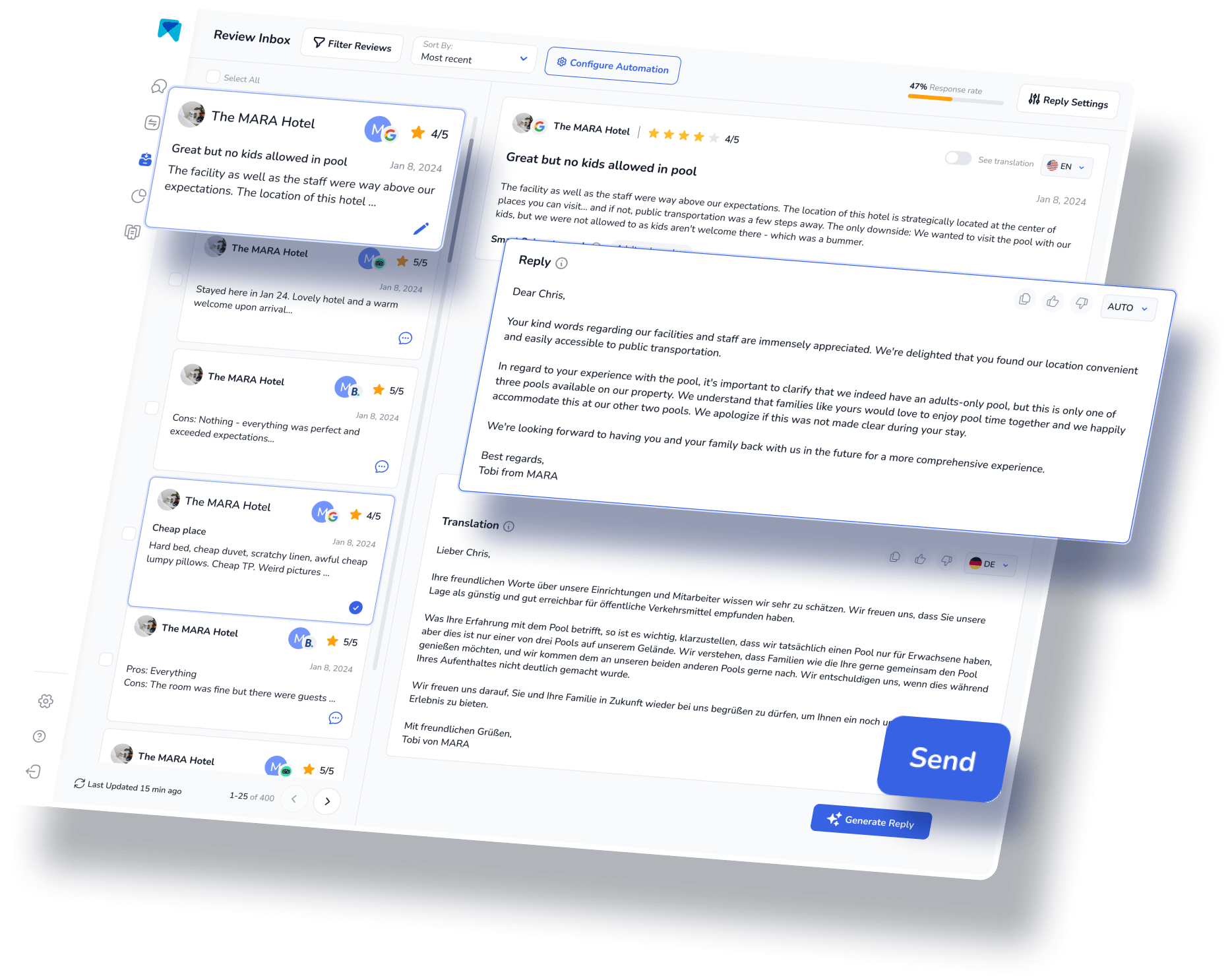
Advanced Review Analytics
To help you understand and analyze the multitude of reviews, the Review Assistant also incorporates Review Analytics. This provides actionable, easy-to-understand insights that are tailored exclusively to your business. With MARA, you can quickly get the gist of all your reviews without needing to read each one. The analysis is so detailed that you can find out about specific issues like "water in the pool is too cold" or "lack of vegan breakfast option”. These insights help optimize guest experience without requiring you to be a data expert.
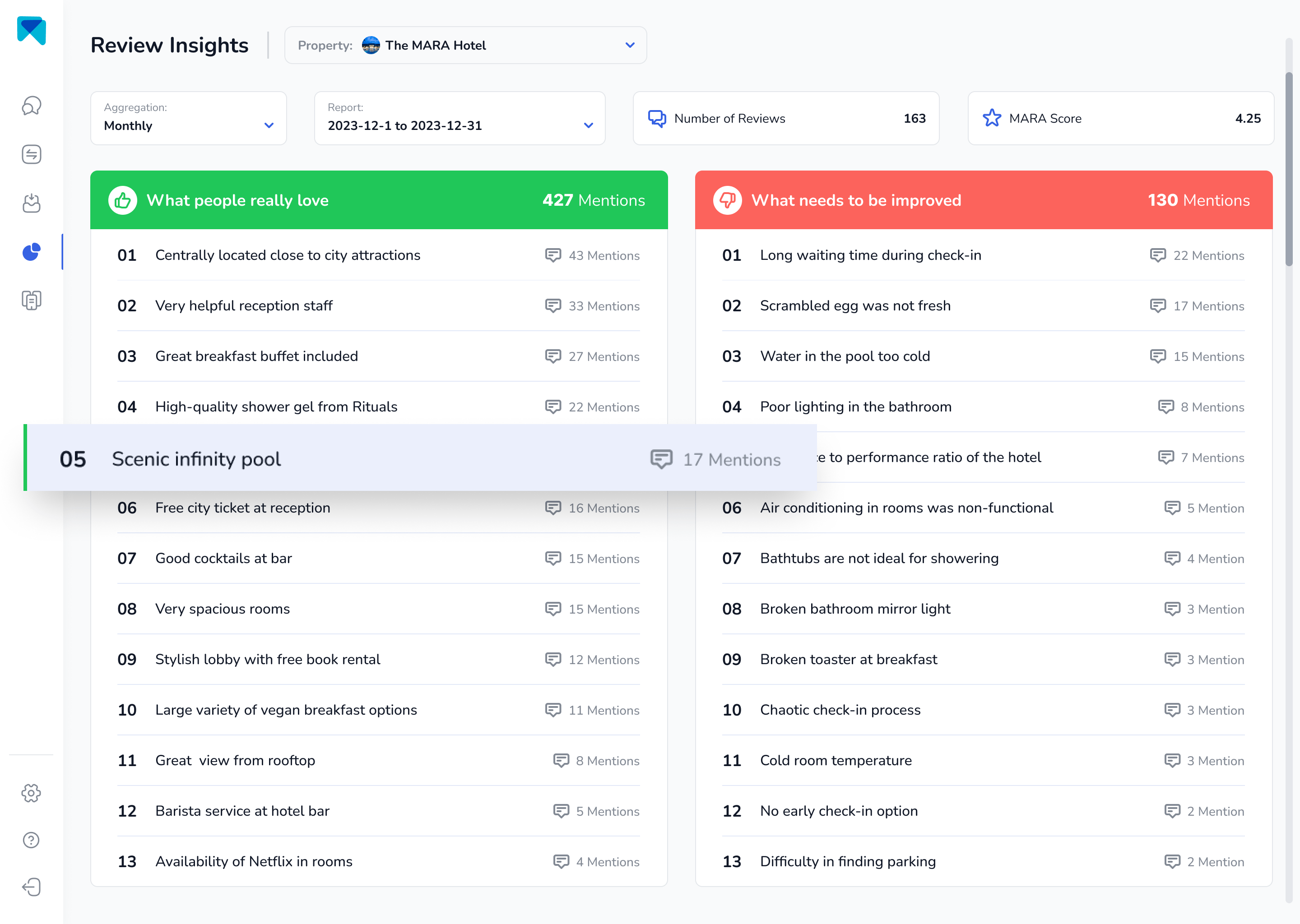
Group Analytics
Additionally, our group analytics overview can provide a quick evaluation of the performance of each location. Other than key metrics such as response rates, ratings, and the number of reviews, MARA also offers category scores based on advanced AI analytics. In the screenshot below, you can find an analysis of hotels with category scores for areas like Food & Beverage, Front Office, and Housekeeping. This analysis aids in swiftly identifying potential weaknesses, with a preview of detailed topics appearing when you hover over a category.

Simplified Review Automation
After gaining trust in your personal AI Review Assistant, you can even go on autopilot and create automation rules. This way, you can specify which reviews should be replied to by the AI directly with no additional approval. With the configuration below, all Google reviews with no text and a star rating of 4 and above are answered automatically.

The most personal response AI
MARA's AI isn't just about efficiency; it's about personalization too. The Brand Voice feature allows the AI to adapt to your tone, making sure your responses sound authentically you. Plus, with Smart Snippets, you can "teach" the AI how to respond to recurring praises or complaints. Your AI then incorporates this information into its responses, but always with different words, providing more personalized, relevant replies.
This review response assistant has quickly become a game-changer for over 2000 customers. Its promising capacity to elevate your overall rating, amplify response rates, glean insights from customer feedback, and economize both time and money, is the reason behind its growing popularity.
Managing online reviews need not be an overwhelming task. With the appropriate software, not only can you streamline the process, but you can also personalize your responses, and derive valuable insights from the reviews. So, why hesitate to give our AI Review Assistant, MARA, a try? It's completely free for testing, doesn't require a credit card, and can be fully operational in less than five minutes.
Final Thought
The future of hotel technology is a landscape teeming with innovation and potential. Embracing the latest advancements is not just an option but a necessity for modern hotels aiming to stay competitive and deliver unparalleled guest experiences. From the integration of AI and IoT to the adoption of cloud-based systems and personalized guest services, the technological trends of 2024 are set to redefine the hospitality industry. By investing in these must-have tools and solutions, hotels can enhance operational efficiency, optimize revenue management, and create memorable, tailored experiences for their guests. As the industry continues to evolve, those who leverage these cutting-edge technologies will undoubtedly set new standards of excellence and lead the way in the digital transformation of hospitality.
Frequently Asked Questions:
Hotels use Property Management Systems (PMS), Revenue Management Systems (RMS), Customer Relationship Management (CRM) software, chatbots, IoT devices, and contactless payment solutions.
New hospitality technology includes AI-driven chatbots, IoT integration for smart room management, contactless check-ins, mobile key access, and advanced data analytics for personalized guest experiences.



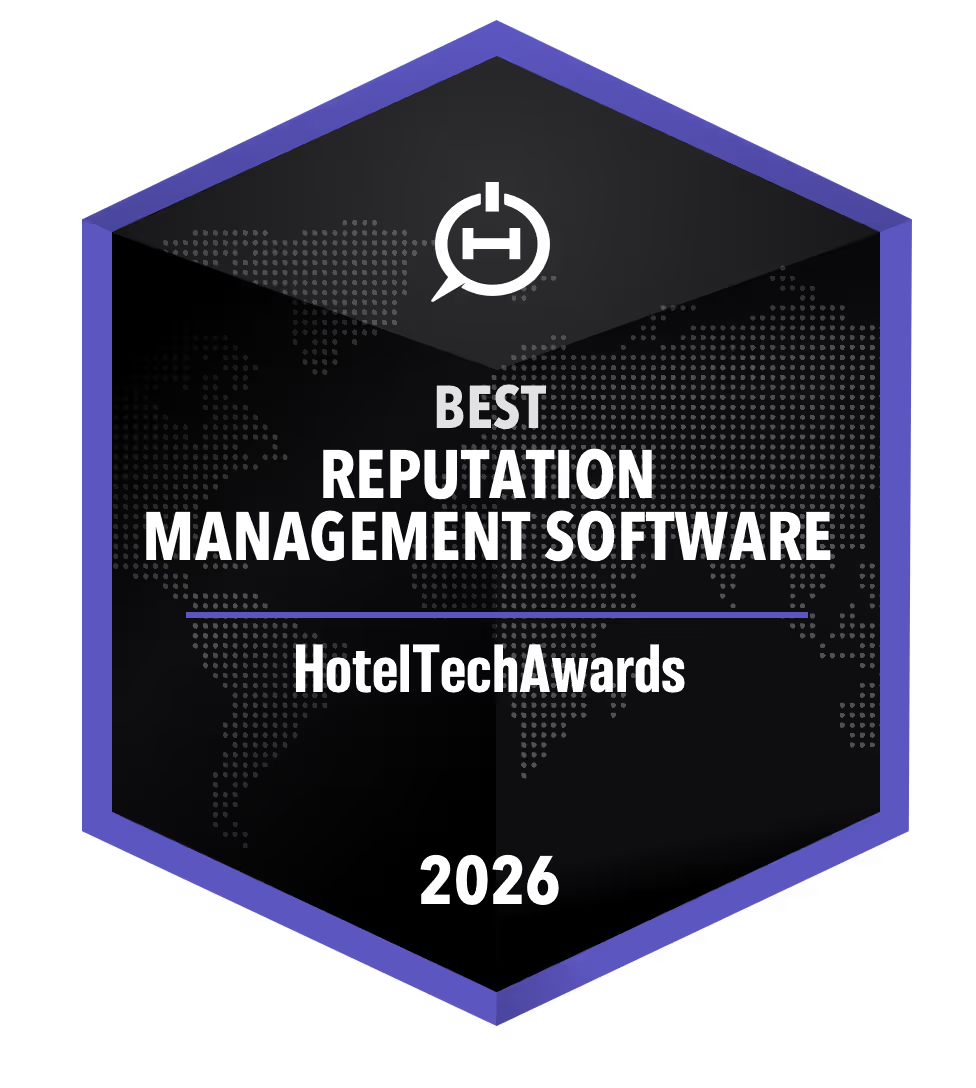

















%20(1)-min.png)
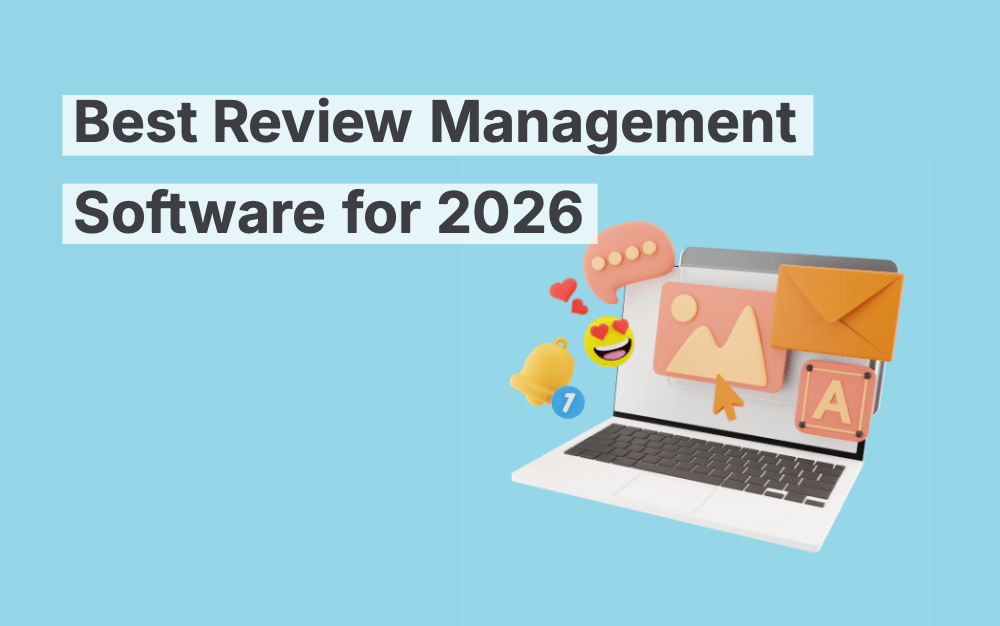
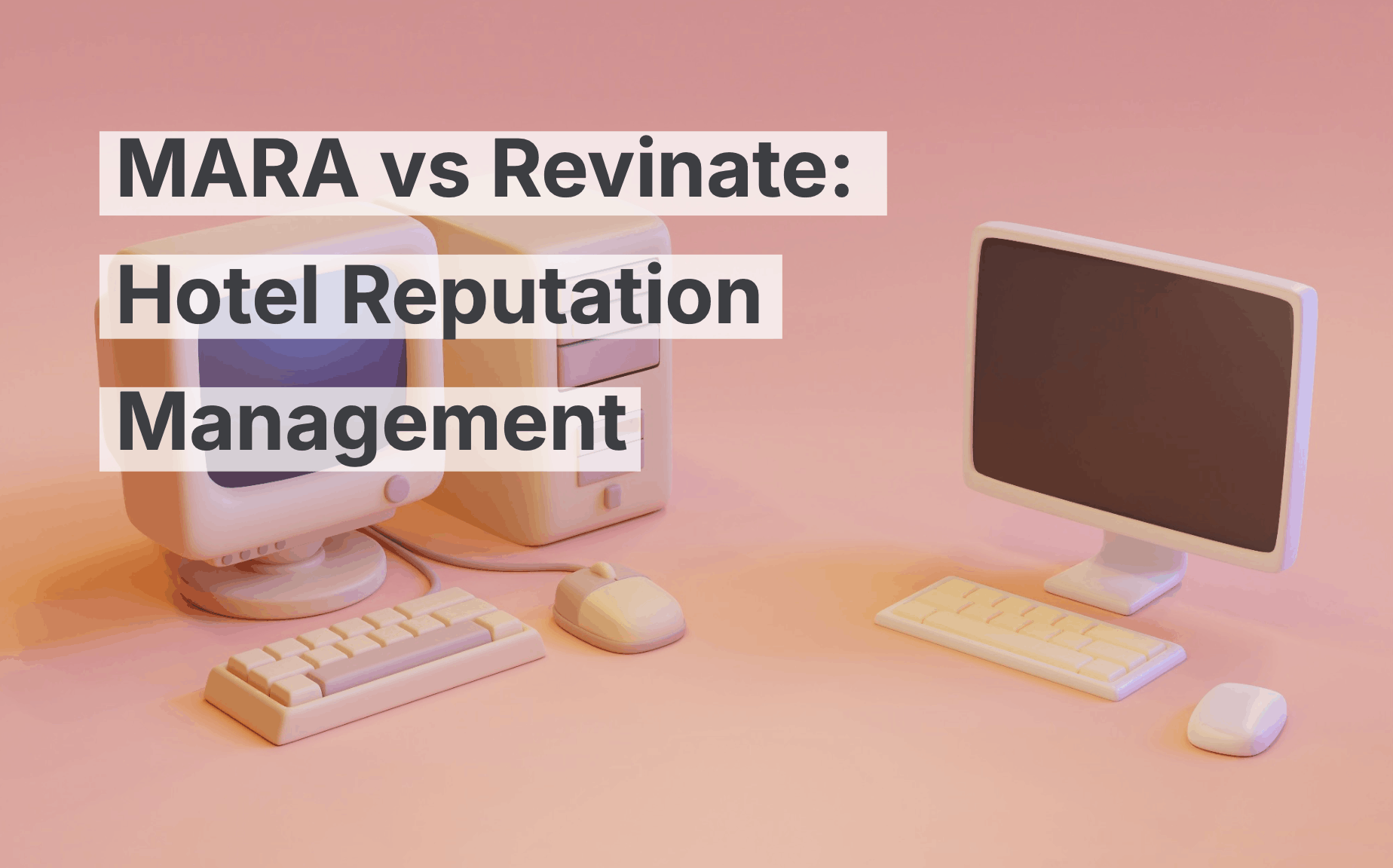






-min.avif)
